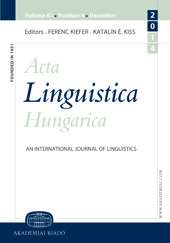Automatic recognition of schwa variants in spontaneous Hungarian speech
Automatic recognition of schwa variants in spontaneous Hungarian speech
Author(s): András Beke, György SzaszákSubject(s): Phonetics / Phonology, Finno-Ugrian studies
Published by: Akadémiai Kiadó
Keywords: vowel neutralization; stressed vs. unstressed syllables; continuous speech; Hungarian; automatic recognition;
Summary/Abstract: This paper analyzes the nature of the process involved in optional vowel reduction in Hungarian, and the acoustic structure of schwa variants in spontaneous speech. The study focuses on the acoustic patterns of both the basic realizations of Hungarian vowels and their realizations as neutral vowels (schwas), as well as on the design, implementation, and evaluation of a set of algorithms for the recognition of both types of realizations from the speech waveform. The authors address the question whether schwas form a unified group of vowels or they show some dependence on the originally intended articulation of the vowel they stand for. The acoustic study uses a database consisting of over 4,000 utterances extracted from continuous speech, and recorded from 19 speakers. The authors propose methods for the recognition of neutral vowels depending on the various vowels they replace in spontaneous speech. Mel-Frequency Cepstral Coefficients are calculated and used for the training of Hidden Markov Models. The recognition system was trained on 2,500 utterances and then tested on 1,500 utterances. The results show that a neutral vowel can be detected in 72% of all occurrences. Stressed and unstressed syllables can be distinguished in 92% of all cases. Neutralized vowels do not form a unified group of phoneme realizations. The pronunciation of schwa heavily depends on the original articulation configuration of the intended vowel.
Journal: Acta Linguistica Hungarica (Since 2017 Acta Linguistica Academica)
- Issue Year: 57/2010
- Issue No: 2-3
- Page Range: 329-353
- Page Count: 25
- Language: English

